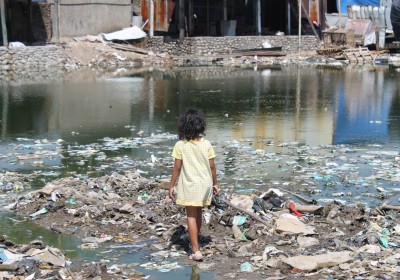Giving Children a Voice in Addressing Urban Poverty Issues
July 27, 2017
Image by Novita Maizir | SMERU
At least 1 out of every 10 children living in Indonesia’s urban areas are classified as poor, but more often than not, their voices aren’t heard by the adults who are trying to improve their welfare.
“It is important to hear what children say about their experiences living in poverty in their own language, including what is important for them to improve their quality of life,” according to a SMERU research report on urban child poverty and disparity published in May 2017.
“Understanding how children see their experiences living in poverty will enable us to comprehend what is actually needed to improve their well-being,” the report states.
The SMERU Research Institute, with support from UNICEF Indonesia, talked children aged 6–17 years old in six urban villages in the cities of Jakarta, Makassar, and Surakarta to find out exactly how they perceive poverty, and how these perspectives can influence policy.
The researchers found, for instance, that children perceive well-being differently from their parents.
Parents from poor families often believe they need to work hard to earn more and afford food, home improvements, education and health care, which would make their children happier.
“However, this assumption needs to be reconsidered. It is because many children actually account the attention of parents as the most important indicator of well-being which makes them happy despite living in poor condition,” the report states.
This means parents have to also learn the importance of providing quality time and care for their children. In terms of programs and policies, community-based organizations can be used to provide consultation services, information dissemination, and training in support of this objective.
Paying attention to complaints among children about not having proper playgrounds can also lead to policies that improve their safety and well-being.
“The lack of a place to play becomes the main reason for children to play in places that are actually harmful to them,” the report notes.
In Surakarta, for example, a number of cases of children drowning have been reported, because children play in the river bank where illegal houses have been evicted and demolished, leaving only the foundations. In all areas researched, the lack of playgrounds has also made children play more at internet cafés and gaming centers.
The research even found that access to a means of transportation was the second most mentioned characteristic of well-being for children, but only 10th for parents. The study noted that fact that means of transport is considered to be one of the most frequently mentioned aspects by children tells us that transportation has become one of the primary needs for poor children and their family.
“In the short term, the approach to solve them can start by expanding the components of the social protection programs or by providing subsidized or free transport,” the report states.
Repositioning children as a source of knowledge has spawned many valuable insights that will enrich the conventional perspective of child poverty, the report notes.
“Neglecting the voice of children means ignoring their well-being,” it concludes.
Indonesia’s Research Institutions Supporting the Development of the Electric Vehicle Industry
Indonesian Muslim Fashion and Cosmetics IKMs Shine at Dubai World Expo 2020
Govt Steps Up UMKM Transformation Efforts in the Midst of Pandemic Slowdown
Govt Encourages Promotion of IKM Products in Digital Era
Government Begins Developing Maritime Training Center in Makassar
Tweets by IDDevForum
